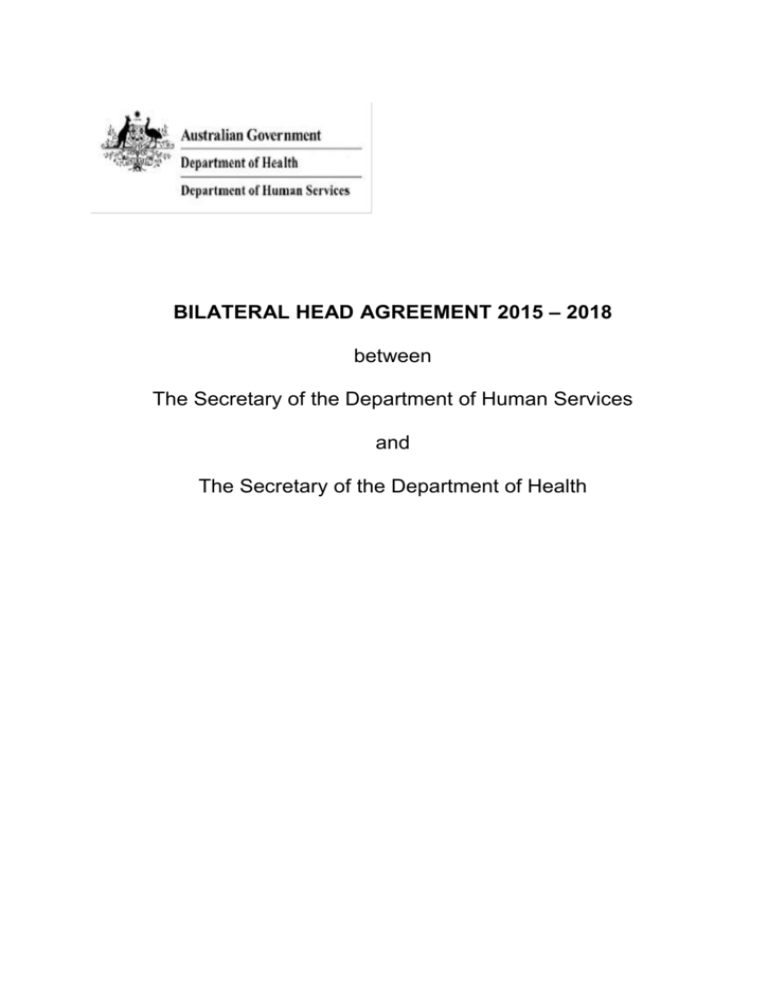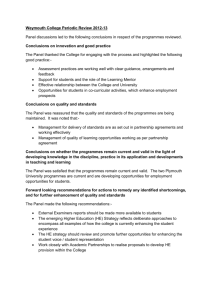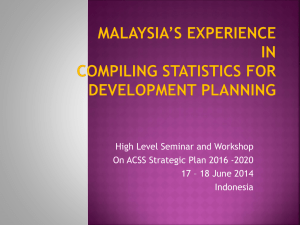THIS AGREEMENT is made on
advertisement

BILATERAL HEAD AGREEMENT 2015 – 2018 between The Secretary of the Department of Human Services and The Secretary of the Department of Health 1. INTRODUCTION The Secretary of the Department of Human Services (Human Services) and the Secretary of the Department of Health (Health) have agreed to enter into a Bilateral Head Agreement for the 2015-2018 period. The Bilateral Head Agreement (the Agreement) records the commitment between the two departments to work in partnership. It sets the expectations for the effective coordination and delivery of a range of Australian Government health policy priorities, objectives and services (full list at Appendix 1) through engagement, transparency, flexibility, responsiveness and appropriate delegation. It recognises the unique relationship between the two departments in performing functions relating to Medicare, Pharmaceutical Benefits, Aged Care, and other health related programmes, and establishes a clear governance framework, including reporting, and capacity for change and growth over time. It recognises the important linkage of programme performance and the performance of the interdepartmental relationship. While the Agreement itself is relational, it reflects and supports compliance with a complex range of legislative frameworks. For example, from Acts germane to particular functions or programmes (such as the Human Services (Medicare) Act 1973 or the National Health Act 1953), and the Public Governance, Performance and Accountability Act 2013, with its associated emphasis on improving the quality of planning, performance monitoring and evaluation, transparency and accountability in accordance with Stage 2 of the Public Management Reform Agenda, to whole of Government regulatory architecture, such as the federal financial framework, freedom of information, or even administrative law. Importantly, the Agreement acknowledges the significant reform facing government and the flow on effect this will have to payment methodologies and system modernisation. The challenge to continue to generate efficient ways of delivering public policy at the same time as embracing data and supporting consumer direction is one that Secretaries see as needing to be supported by collaboration and innovation. Data sharing and analysis of the behaviour of providers and consumers will also be paramount in designing risk-based compliance programmes, particularly in the knowledge that customer compliance will be administered by Human Services, while provider compliance and associated functions will reside in Health. 2. GOVERNANCE The Agreement seeks to create benefits for both departments through timely decision-making at the appropriate level, reduced complexity and the removal of red tape. These benefits have been enabled through the strong relationship that has been developed between the departments since the signing of the first Bilateral Head Agreement in November 2012. A strengthened governance framework will underpin this agreement (Appendix 2), this includes the following key forums: Secretaries Meetings will take place as determined by the Secretaries, but at least once a year. Management Committee Regular formal meetings of Deputy Secretaries that enables strategic oversight of the interactions between the two departments will be held. Membership is primarily at Deputy Secretary and SES Band 2 levels to ensure a whole-of-system strategic approach. The committee will have a focus on strategic issues, especially issues that will require co-design and /or implementation by Human Services and involving Human Services on issues that will impact service delivery as early as feasible. Health will provide a regular update on current and forward policy development, programme and horizon scanning activities relevant to the relationship with Human Services providing updates on its strategic information, operations and service delivery environment. Sub Committees may be established as required. 1 Operational Committees Regular formal meetings of SES Band 2 officers that enables operational oversight and in turn, enhanced effective line management of programmes through direct bilateral engagement between Human Services and Health. Membership is at SES Band 2 level drawn from across all responsible programme areas in both agencies, with additional membership at the Band 1 level where appropriate. One Operational Committee will focus on the health programmes and the other committee to focus specifically on Aged Care. The focus of these committees will be on the significant operational business issues arising from programme delivery. Thesecommittees will be supported by appropriate performance reporting, data analytics as well as KPIs. These forums will actively support cultural change within each department that will be required to deliver on the underlying principle of partnership. Each department will sponsor Secretariat Teams which coordinate the cross-agency support required for the Operational and Management Committee meetings. 3. OTHER INFORMATION Period of the Agreement The Agreement takes effect on the date it is signed by both Secretaries and expires three years from that date. It replaces the earlier Bilateral Head Agreement entered into on 1 November 2012 and may be extended with the written consent of both Secretaries. Either party may terminate this Agreement (and any associated documents) by giving written notice to the other within 30 days. Programmes An agreed list of all programmes or programme of activities currently managed by Human Services on behalf of Health is at Appendix 1. Notably, the relevant programme agreements for these programmes no longer form a part of this document but have been devolved to Programme Managers.1 Agreement and subsequent management of programme level working arrangements will be undertaken in a devolved programme space, with content agreed at a minimum Band 1 level (or delegate), and only performance monitoring and issues escalation in the first instance, will be brought to the Operational Committees. Programme Agreements are expected to be subject to review over the life of the Agreement and the Operational Committees will each determine a rolling schedule. Programme Managers may also jointly design and develop attachments, guidelines or other documents referred to in the Programme Agreements. Changes to the Agreement Over the life of the Agreement, it is anticipated that amendments to existing programmes (and the associated programme agreements) will be required, and/or new initiatives developed and implemented. It is the expectation of Secretaries that officers (at all levels) in both departments will conduct these negotiations in good faith, being as responsive as possible and giving due consideration to early engagement, to not only administered costing (New Policy Proposal) implications, but departmental cost pressures. In respect of new initiatives and shared strategic direction between the departments, it is considered Management Committee will have a key role, and in relation to operationalising directives, the Operational Committees will guide and support Programme Managers. 1 In the majority of programmes, it is considered the Programme Manager will be at the EL2 level, with their Lead Program Manager being at the SES1 level. 2 Variation Changes to the Agreement of a substantial nature, including issues relating to budget and governance arrangements or changes that alter the principle of the agreement would need to be endorsed by the Secretaries. Any changes to the Agreement of a minor or operational nature such as style or expansion of information etc, will be managed by the Operational Committees, ensuring Management Committee awareness of changes. Renegotiation It is expected that work to replace this Agreement will commence at least six months before its expiry, notwithstanding Secretaries may elect to extend it by exchange of letters. Escalation of issues Any serious issues, problems or disputes that may arise between the relevant quarterly meetings of the Operational and Management Committees will be brought to the attention of the other department as soon as possible, through standard departmental escalation procedures. Examples of the types of issue that may follow this path are matters which: have, or have the potential to, materially disrupt the delivery of services; have been, or may be raised in the media that relate to the policy outcomes of programmes, or delivery issues of such programmes; have, or have the potential to, adversely affect the reputation of the Government or either department; or relate to a significant failure by a party to meet service standards or service levels. Performance Reporting The Operational and Management Committees will evaluate and measure the effectiveness of the relationship between the agencies as agreed between the departments. Where possible, reporting will leverage existing internal reporting mechanisms and channels, in order to reduce administrative burden. Officer Exchange Programme As a means of increasing knowledge and understanding of the work, roles and functions of each department, an officer exchange programme will be pursued under this Agreement. Officers at the EL1 or APS6 level will have the opportunity to work for a specified period of time within their counterpart programme area. This will enable an increased awareness, at the operational level, of programme management perspectives, ultimately leading to improved programme management across agencies. 3 EXECUTION SIGNED BY THE SECRETARY OF THE DEPARTMENT OF HUMAN SERVICES: Signed: ___________________________________________________ Name: ___________________________________________________ Date: ___________________________________________________ Witness: ____________________________________________ SIGNED BY THE SECRETARY OF THE DEPARTMENT OF HEALTH: Signed: ___________________________________________________ Name: ___________________________________________________ Date: ___________________________________________________ Witness: _________________________________________________ 4 Appendix 1: Programmes (and programme of Activities) Programme definition: A programme (or arrangement, activity or sub-element, thereof), delivers benefits, services or transfers payments to individuals, industry/business or the community as a whole and are primary vehicles for Government Agencies to achieve their intended results. Programme listing in Bilateral Head Agreement: Medicare and Related Programmes Medicare Programme 1. Pathology Services and Programmes 2. Diagnostic Imaging 3. Review and Maintenance of the Medicare Benefits Schedule 4. Information Management 5. Medicare Safety Net Medicare Programme Administration 1. Services for eligible people 1.1 Payment of Medicare benefits to eligible persons in a timely manner 1.2 Enrolment and assessment of persons who are eligible to receive Medicare benefits 1.3 Registration of prescribed dental patients under the Cleft Lip and Cleft Palate Scheme as defined in section 3BA of the Health Insurance Act 1973 1.4 Provision of Medicare Entitlement Statements 1.5 Provision of communication material 2. Services for providers 2.1 Payments to providers in accordance with Government endorsed timeframes 2.2 Provision of statements to claiming providers listing their claims for Medicare benefits assessed for bulk-billing claims 2.3 Administration of the 90 day pay doctor cheque scheme 3. Provider Eligibility 3.1 Provider registration and access 3.2 Specialist recognition 3.3 Overseas trained doctors 4. Pathology accreditation - Approved Pathology Authorities, Approved Pathology Laboratories, Approved Collection Centres 5. Diagnostic Imaging Equipment Registration 6. Representation on a number of Medicare and related programmes’ management and consultative committees Dental Benefits Schedule Pharmaceutical Benefits Scheme PBS and Related programmes Administered Activities 1. PBS claims and under co-payment transmissions submitted via PBS Online or Manually 2. Public Hospitals participating in the Pharmaceutical Reforms 3. Section 94 Private Hospitals 4. Remote Aboriginal Health Services Programme 5. Paraplegic and Quadriplegic Programme 6. Epworth and Cabrini Private Hospitals Paperless Prescribing and Claiming Trial 7. Multiple Hospitals Paperless Claiming Trial 8. Paperless Prescribing, Dispensing and Claiming Trial 9. Stoma Appliance Scheme 10. Emergency Treatment Programme 11. Prescriber Bag Supply 12. Safety Net 13. Patient Refunds 14. Indigenous Chronic Disease - PBS Co-payment Measure 15. Prescription Shopping Programme Administer Authority Approval Arrangements 1. Process Authority Approval Requests 2. Specialised Drugs and Complex Drug Listings 3. Therapeutic Group Premium 4. Special Patient Contribution 5. Efficient Funding of Chemotherapy Programme 5 Administer Approval Arrangements for Approved Suppliers 1. Approved Pharmacist (Section 90 NHA) 2. Process Decisions made by the Minister under Section 90A NHA 3. Dispensing Medical Practitioners (Section 92 NHA) 4. Public Hospitals participating in Pharmaceutical Reforms (Section 94 NHA) 5. Public Hospitals accessing Highly Specialised Drugs (Section 94 and Section 100 NHA) 6. Private Hospital Authority (Section 94 NHA) Administer Other Arrangements 1. IVF/GIFT Programme 2. Botulinum Toxin Programme 3. The Herceptin Programme for Late Stage Metastatic Breast Cancer 4. Supply of PBS Stationery Items and Supplies 5. Assess other methods of preparing a prescription 6. Provide promotional material 7. Highly Specialised Drugs (HSD) Programme for Hospitals 8. Web Partnering Agreements 9. Allied Health Professional Prescribing - Authorised Nurse Practitioner 10. Allied Health Professional Prescribing - Authorised Midwives 11. Growth Hormone Programme Other Payments 1. Pharmacy Compensation Arrangements 2. Electronic Prescription Fee Programme Administration 1. Highly Specialised Drugs Community Access Arrangements 2. Supply and PBS/RPBS Claiming from a Medication Chart in Public and Private Hospitals 3. PBAC Administration Process 4. 6CPA Measures 5. Delisting over the counter drugs 5.1 Pharmaceutical Service Federal Commission of Enquiry 5.2 Discounting Co-payments Electronic Transfer of Prescriptions 1. ePrescribing Aged Care and related programmes Home Care 1. Subsidy Payment Processing 2. Income Test Assessment and related processing 3. Funding and financial hardship management arrangements Residential Care and Flexible Care (Transition Care) 1. Subsidy Payments processing 2. Means Test Assessment and related processing 3. Funding and financial hardship management arrangements 4. Aged Care Funding Instrument (ACFI) Reviews Aged Care Education and Training Incentive 1. Incentive payment processing 2. Funding and Financial Management Continence Aids Payment Scheme (CAPS) 1. Claims processing 2. Payments processing 3. Query Resolution Health 1. Provider Compliance Compliance 2. Customer Compliance Disaster Health Care Assistance Scheme Mental Health Nurse Incentive Programme Practice Nurse Incentive Programme Practice Incentives Programme General Practice Rural Incentives Programme 6 Radiation Oncology Health Programme Grants Rural Procedural Grants and Rural Locum Education Assistance Programme Office of Hearing Services-Claim Payment System Office of Hearing Services-Customer Confirmation eService Private Health Insurance Rebate Lifetime Health Cover Mailout National External Breast Prostheses Reimbursement Programme Compensation Recovery Programme Australian Childhood Immunisation Register Australian Organ Donor Register National Bowel Cancer Screening Register Medical Indemnity Midwife Professional Indemnity Scheme Personally Controlled Electronic (eHealth) Record National Emergency Call Centre Surge Capability Internet Gateway for Therapeutic Goods Administration Tuggeranong Data Centre (ends 31 December 2015) 7 Appendix 2 - Governance Arrangements Programme Manager Oversee administration of Programme Agreement. Regular liaison with Human Services and Health counterparts. Manage current or emerging issues as well as risks. Oversee bi-annual review of Programme Agreement. Day-to-day administration of Programme Agreement. Regular liaison between Human Services and Health counterparts. Conduct bi-annual review of Programme Agreement. Lead Programme Managers Refer unresolved issues Formalise and agree Meet at least quarterly to ensure assurance of inter-departmental performance. Monitor delivery of services and progress of initiatives. Execute minor variations to the Agreement. Resolve issues referred by Bilateral Head Agreement Managers and Lead Programme Managers or escalate to Management Committee by exception. Meet quarterly to oversee operation of the Agreement. Lead strategic engagement and provide direction on whole of government issues. Seek opportunities to improve effectiveness and efficiency of working relationship between agencies. Agree and review the Risk Management Plan(s) and their operation. Resolve high level and major issues, by exception only, referred by OC or escalate when necessary. Operational Committees (SE Band 2) - one Health and one Aged Care Committee Refer unresolved issues by exception only Refer issues Management Committee (Dep Sec) Compliance Sub-Committee Report to and refer only unresolved issues that are high level and significant Secretaries Meet regularly to discuss issues referred by the Management Committee Execute changes to the Agreement that are substantial in nature including changes related to Budget and governance arrangements or changes that alter the principles of the Agreement. May inform respective Ministers of issues Ministers 8







